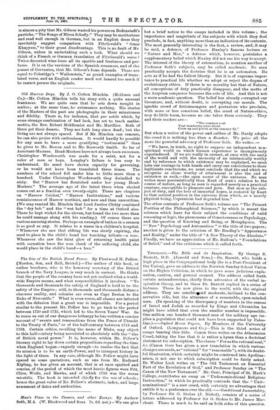The Rise of the British Naval Power. By Fleetwood H.
Pellew. (Mardon, Son, and Hall, Bristol.)—The author of this book, or rather brochure, who is the honorary secretary of the Bristol branch of the Navy League, is very much in earnest. He thinks that the people of the country have not yet realised what a world. wide Empire means, and what responsibilities it involves. " To thousands and thousands the safety of England is held to be the safety of the Empire ; still, to thousands and thousands distance obscures reality, and colonies are even as Cape Breton to the Duke of Newcastle." What is even worse, all classes are infected with the delusion that a great war is impossible. For a period similar to the present Mr. Pellew has to go back to the period between 1750 and 1755, which led to the Seven Years' War. So to rouse us out of our dangerous lethargy he has written a concise account of "events and transactions from the Peace of Utrecht to the Treaty of Paris," or of the half-century between 1713 and 1763. Certain critics, recalling the name of Blake, may object to this half-century being associated so absolutely with the "rise of British naval power." It is, however, within Mr. Pellew's literary right to lay down certain propositions regarding the time when England began—vaguely enough—to realise the fact that its mission is to be an earth-Power, and to interpret history in the light of these. In any case, although Mr. Pellew might have spared us some quotations, such as one from Mr. Rudyard Kipling, he has given an account, that is at once spirited and concise, of the period of which the most heroic figures were Pitt, Clive, Wolfe, and Hawke, and of which 1759 was the atoms mirabilis. The book is intended chiefly for the use of schools ; hence the great value of Mr. Pellew's abstracts, index, and large armament of dates and authorities.


















































 Previous page
Previous page